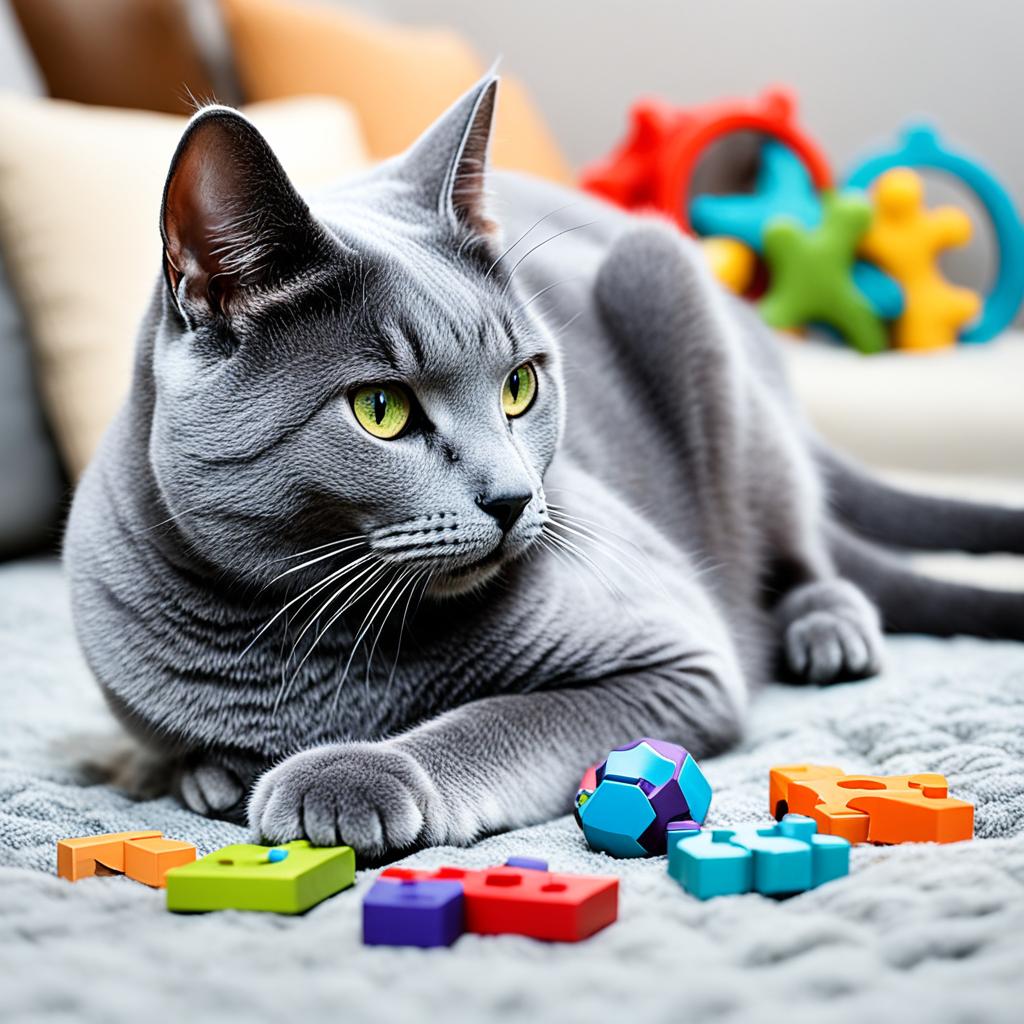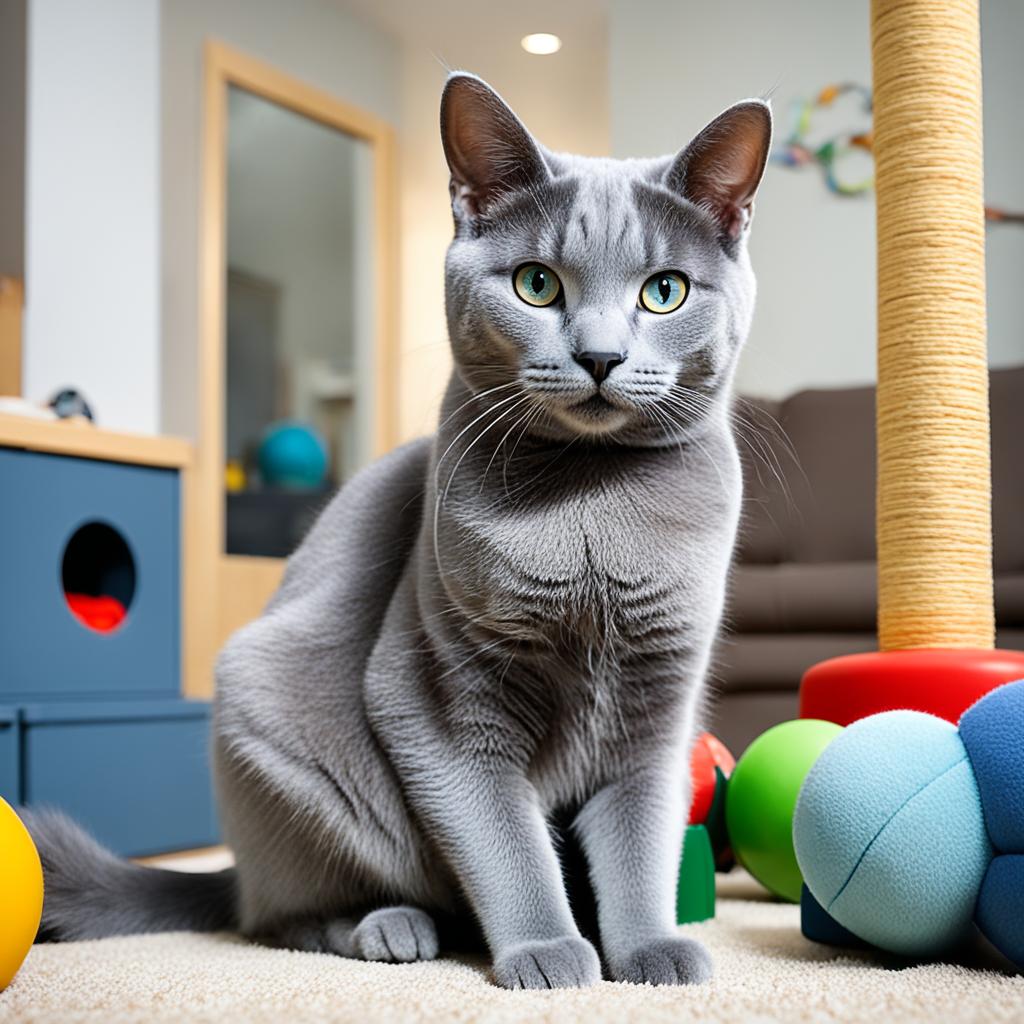Have you seen your Russian Blue start to walk back and forth or meow when you’re about to leave? These loyal cats feel a lot when they’re not with their owners. Knowing how to handle their anxiety is key to keeping them happy and well.
Russian Blues are very sensitive and need more attention than some other cats. It’s important to give them love and support every day. This keeps their separation anxiety under control. But what exact steps can you take to make them feel better when you’re not there? Take a closer look at our advice to see how you can help your Russian Blue.
Key Takeaways
- Understanding Russian Blue cat anxiety is essential for your pet’s well-being.
- These cats require significant human companionship and attention.
- Learning to identify the signs of separation anxiety can help you address your cat’s needs better.
- Effective support includes creating a safe and secure environment for your cat.
- Proper management of separation anxiety involves consistent care and attention.
Understanding Russian Blue Cat Separation Anxiety

Russian Blue cats can feel very anxious when left alone. This can worry their owners a lot. It’s important to know how to spot and deal with this issue early. This way, your beloved cat can stay happy and healthy. Let’s look into the main points of this problem.
Signs and Symptoms of Separation Anxiety
When a Russian Blue cat is anxious, you’ll see it in their actions. They might scratch furniture or chew on things they shouldn’t. They also may meow a lot more than usual or go to the bathroom outside their litter box.
- Destructive behavior: Scratching furniture, chewing on non-food items.
- Excessive vocalization: Meowing, crying, or yowling more than usual.
- Inappropriate elimination: Urinating or defecating outside the litter box.
- Changes in appetite: Eating significantly more or less.
- Altered grooming habits: Over-grooming or neglecting grooming.
Common Causes of Separation Anxiety in Cats
It’s key to know what causes this anxiety to manage it well. Russian Blues may have anxiety because of:
- Genetics: Some breeds, like Russian Blues and Siamese, are predisposed to anxiety.
- Early weaning: Kittens separated from their mother too soon can develop anxiety.
- Traumatic experiences: Past negative events can trigger fear and stress.
- Cognitive decline: Older cats may develop anxiety due to cognitive issues.
- Environmental factors: Things like long work days, changes in their routine, or an unstable home life can lead to anxiety.
Each cat’s situation is different, so it’s vital to pay close attention to yours. Showing patience and finding a special method help your Russian Blue get through these issues smoothly.
How to Handle Russian Blue Cat Separation Anxiety?

Dealing with separation anxiety in your Russian Blue cat is complex. It starts with finding what triggers it. Key to success is spotting specific behavioral cues. This helps in making effective support plans.
Identifying Triggers
Figure out what makes your Russian Blue anxious. Watch for schedule changes, moving, or losing a loved one. Even small changes can stress them. If your cat seems more anxious, they might be sensitive to these changes.
Behavioral Signs Specific to Russian Blue Cats
Russian Blues show unique behaviors when anxious. They might become very clingy. You might notice they’re more agitated or stressed when you leave.
Using a camera to check on them when you’re gone can help. This allows you to see what’s going on and find better ways to reduce their anxiety.
Observing and acting on your cat’s separation anxiety is key. This helps keep your pet emotionally well when you’re not there.
| Trigger | Behavioral Sign | Tips to Mitigate |
|---|---|---|
| New Work Schedule | Clinginess | Install Pet Camera |
| Relocation | Agitation | Create a Comfort Zone |
| Loss of Family Member | Over-stressed | Leave Scented Items |
Environmental Enrichment for a Happier Cat

Improving your home’s environment is vital for a Russian Blue’s anxiety. It’s not just about making it look nice. It’s about making your feline friend’s life more joyful.
Interactive Toys and Puzzles
Interactive playthings and brain teasers keep your cat mentally engaged. These are like puzzles or games that exercise your cat’s mind and body. They imitate hunting, which is great for letting cats be their wild selves safely. You can choose from laser pointers to balls that dispense treats. There are many ways to keep your cat entertained.
Creating Safe Spaces and Hideouts
A special hiding place is important for every cat. It’s their go-to spot when they need peace. It could be a comfy cat tree, a secluded corner, or just a simple cardboard box. These spots are essential for easing anxiety in Russian Blue cats.
Ready to make your house the perfect place for your kitty? Here’s what you need:
| Enrichment Item | Benefits |
|---|---|
| Interactive Toys | Encourages physical activity and mental stimulation |
| Puzzles | Promotes problem-solving and cognitive skills |
| Cat Trees | Provides a climbing space and vantage point |
| Hidden Nooks | Offers a secure retreat for stress relief |
Behavioral Modification Techniques

To help with separation anxiety in Russian Blue cats, using targeted behavior techniques is crucial. These techniques can lower your cat’s stress. They also create a feeling of safety and routine for your pet.
Gradual Desensitization
Gradual desensitization means introducing your cat to what makes them anxious slowly. This way, your cat can get used to things that usually upset them little by little.
- Start small: Begin by leaving for short time, then slowly increase it.
- Positive reinforcement: Reward your cat when you leave with treats or cuddles. They’ll start to like when you are gone.
- Consistency is key: Stick to a leaving and coming back routine. It helps lower your cat’s anxiety.
Implementing a Consistent Routine
Having a set schedule really helps with separation anxiety training for cats. Cats love knowing what to expect. A regular routine helps them feel safe.
- Set feeding times: Having meals at the same times each day is a big help.
- Designate playtime: Playtime every day is good for your cat’s body and mind.
- Comforting sanctuary: Make a cozy spot with their favorite things for them to relax in.
| Technique | Description | Expected Outcome |
|---|---|---|
| Gradual Desensitization | Introducing anxiety triggers slowly | Your cat becomes less sensitive and stressed gradually |
| Consistent Routine | Having a regular schedule for eating and playing | It makes your cat feel more secure and settled. |
By following these behavior modification for Russian Blue cats, you can help your cat be calm when you’re away. This leads to a peaceful and happy atmosphere at home.
Using Calming Products and Supplements

Handling your Russian Blue cat’s anxiety can be easier than you think. Using feline separation anxiety solutions like pheromone diffusers and ThunderShirts helps a lot. These products copy natural calm signals, easing your cat’s mind when you’re not around.
It’s also smart to add supplements like L-tryptophan, Zylkene, and Bach Flower Remedy. They’re all meant to boost your cat’s mood, making them feel more at ease. Always talk to your vet before giving any new supplements. They’ll make sure what you choose is right for your cat.
Let’s compare some popular calming aids:
| Calming Product | Type | Benefits |
|---|---|---|
| Pheromone Diffuser | Plug-in device | Emits synthetic pheromones to create a sense of security |
| ThunderShirt | Wearable wrap | Applies gentle, constant pressure to reduce anxiety |
| L-tryptophan | Supplement | Supports serotonin production, promoting relaxation |
| Zylkene | Supplement | Derived from milk protein, known to have calming effects |
| Bach Flower Remedy | Herbal tincture | Utilizes natural flower essences to ease stress |
Mixing these feline separation anxiety solutions can really help your Russian Blue. By using these calming products wisely, you can make a big difference in how your cat deals with separation. This can lead to a stronger, happier, and healthier bond with your cat.
When to Consider Professional Help

Sometimes, your Russian Blue’s anxiety can be hard to manage, like sailing on choppy waters. If you’ve tried everything and it’s not working, it’s wise to seek professional help. You could talk to a vet you trust or look for feline behavior experts. They have the knowledge to give your cat the care it needs.
Consulting a Veterinarian
Booking a vet appointment is the first step. Vets can check if there are any health issues causing your cat’s anxiety. They will do check-ups and might even suggest blood tests. Finding health problems early means your pet can get the right care soon. This can lower their stress levels.
Seeking Help from a Feline Behaviorist
If your cat has behavioral problems, a feline behavior expert can help. They focus on how to change your cat’s actions to reduce anxiety. With their expertise, they will create a special plan just for your Russian Blue. This approach aims to make your cat feel more at ease and happy.
Preventing Future Anxiety Episodes

Keep your Russian Blue cat free from anxiety by being proactive. Start with socializing them early. Regular exercise and brain games also help prevent anxiety.
Early Socialization
Socializing your cat young is key to preventing anxiety. Expose them to new places and people. This makes them confident and chill in different situations, lowering their stress levels.
Regular Exercise and Mental Stimulation
Daily exercise and fun that makes them think is essential. Play with them using toys that make them move. This fills their need for hunting.
Doing puzzles and games is also great. It keeps them smart and entertained. Your cat will be less likely to get anxious when left alone.
Additional Tips for Managing Separation Anxiety

Dealing with this issue in cats, like the loving Russian Blue, needs good plans. Using tech and comforting ways can really help.
Utilizing Pet Cameras
Bring advanced tech into play with pet cameras for your Russian Blue. These gadgets let you watch and talk to them from far away. It helps them feel less anxious and keeps them safe.
Comforting Techniques While You’re Away
Letting your cat have your scented items at home is very calming. Things like your old T-shirts or blankets can work wonders. Also, playing soft music or sounds of nature creates a peaceful vibe.
Remember, every Russian Blue is different. Customizing these comfort tips will help a lot too.
Putting these tips to use will surely make your pet feel safe and cozy. It’s all about lessening the impact of being apart.
Conclusion
Handling separation anxiety in your Russian Blue doesn’t have to be overwhelming. With some key tips, you can make your home a peace of mind for your furry friend. It’s important to know that Russian Blues are affectionate and loyal. This makes it vital to meet their unique needs.
To help, add toys and puzzles around your home. Also, make safe spots for your cat and try calming products. Keep a steady routine and help your cat get used to things that scare them. These steps will keep your cat calm and happy.
If anxiety doesn’t decrease, talk to a vet or a cat behavior expert. They can offer more help. In the end, making your home secure and fun eases anxiety. It also makes your bond with your Russian Blue stronger. Following our tips will help keep your clever and loving cat in top shape.
FAQ
How can I tell if my Russian Blue is suffering from separation anxiety?
Look for signs like tearing up things, howling too much, or going to the bathroom where they shouldn’t. Items to notice are when they eat less or stop grooming. They might act super needy or upset when you leave.
What are common causes of separation anxiety in Russian Blue cats?
Some common causes are genetic, taken from their mother too soon, or traumatized. Getting old can also make it worse. A lot of alone time or big changes in their life can lead to this. Breeds like Siamese and Russian Blues might be more sensitive to it.
How do I identify triggers for my Russian Blue’s separation anxiety?
Pay attention to new changes or losses in your family. Using cameras can help you spot what exactly makes your cat anxious.
What behavioral signs are specific to Russian Blue cats suffering from anxiety?
They might get too attached, feel very nervous, or clearly worry when you’re leaving or coming back. You may notice they look sad or are under a lot of stress.
How can environmental enrichment help my anxious Russian Blue?
Keeping them entertained with interactive games mimics hunting, which is good for them. Creating spots for them to feel safe can reduce their anxiety.
What is gradual desensitization, and how can it help my cat?
Getting your cat used to what scares them little by little is gradual desensitization. This helps them not react so badly over time. Teaching them that you leaving means something good can also work.
Are there specific products that can help calm my anxious Russian Blue?
Yes, things like pheromone diffusers and ThunderShirts can make a difference. Supplements, like L-tryptophan and Zylkene, or Bach Flower Remedy, can also help. But, talk to your vet before using any of these.
When should I consider seeking professional help for my Russian Blue’s anxiety?
If your cat’s issues seem to be making them sick or they’re very anxious, see a vet. A cat behavior expert can also give advice on serious behavior fixes.
Getting your cat used to being around different things early on helps a lot. It makes them less afraid of being alone as they grow.
What are some additional tips for managing my Russian Blue’s separation anxiety?
Using pet cameras to see and play with your cat when you’re not there can be helpful. Leaving things that smell like you or playing calming music can make them feel safer and calmer.




